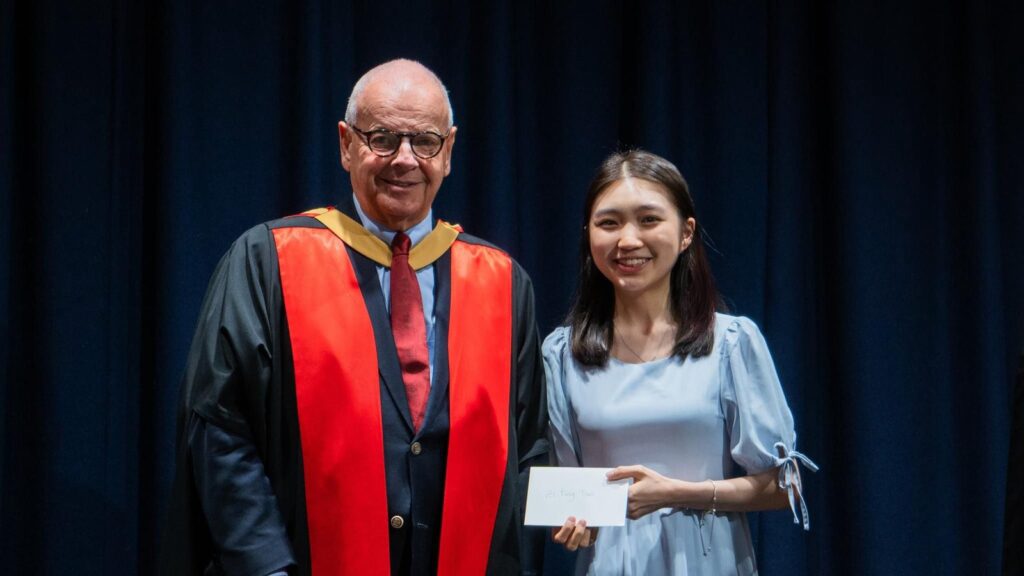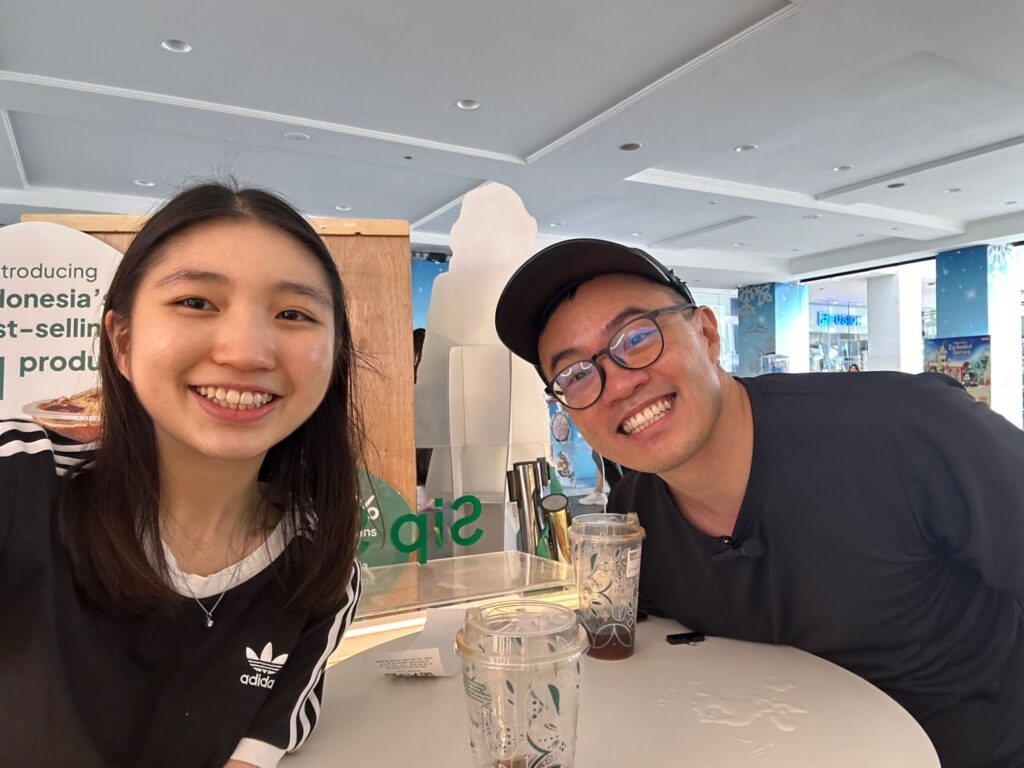Catching up with one of my past students, Zi Ting, Class of 2020, I am going to document an interview with her about her life after getting into medical school at the UNSW, Australia. This may be of interest to those who are keen to get into an Australian medical school as a foreigner.

A little back story before applying for an Australian medical school
BYANG. There was a period you were missing my classes. Only later did I know you are away due to a medical condition. What was that about?
Zi Ting. I suffer from multiple bowel obstructions with an unknown cause back then. I have to seek out my ex-gastroenterologist every couple of weeks since I was 6 months old, for symptomatic treatment as well as relief.
The obstructions occur every 3-5 weeks, and each time, I get high fevers, severe pain, nausea, vomiting inn addition to diarrhea.
Despite learning to manage my condition, there were a couple of times where I got really bad from the obstruction thus missing your classes.

Medically, it can get ugly for her…
BYANG. That sounds serious! Can you tell us what’s the worst that can happen when you get obstructions?
Zi Ting. Personally, the worst was the debilitating symptoms, being bed-bound due to the pain, but not able to rest. I remember lying in bed staring blankly at the clock, knowing the pain will return in a few minutes. That was draining.
And even worse, I know that nothing can be done back then about the situation. I really want to study desperately trying to catch up with school work but not being able to due to the symptoms. I was feeling down for a bit but later adopted the mindset of doing my best in every aspect that I am in control of. Most importantly, not spend time being upset with the circumstances I can’t control.
Doctors would say the worst that can happen is bowel perforation or ischaemia. Bowel perforation can lead to severe infections like sepsis or peritonitis and can be life threatening.

Working on her grades to get into an Australian medical school
BYANG. During class I never noticed any difference. Because you were always contributing, and never asked for any accommodations for your ailments. How the hell did you manage the punishing A level regime in your school, in addition to tuition keeping up with everything as well as going on to score that elusive A in biology?!
Zi Ting. Health-wise, things were better in JC compared to secondary school. And importantly, I adopt a grateful mindset.
For the times I feel okay, or at least, when I can study, so I make the most of it. During these times, I began to feel the discipline and determination, to make use of every precious second available to me when I am well.
The medications regiment, doctor appointments, time off school and my sickness will leave me with much less time than everyone else. So scoring an A for bio was still quite a far-fetched goal for me at first.
But honestly Mr Yang, I think that’s where you came in. The way you taught bio was perfect for me. I think the best way I can describe it is that you “taught me how to fish rather than giving me the fish”, so you taught me how to optimize my time, and on my part, I executed as best as I could.

Australian medical school, how it went
BYANG. You made it sound easy but I know that in the background, it was blood (literally), sweat and (many real) tears shed. Mad respect. So after getting, the A level results, I know you wanted to pursue medicine in part due to your history, can you detail this journey to the point where you are today?
Zi Ting. After getting my A level results, I was elated, because I was quite sick leading up to the A levels. But still, I was 1 subject shy of straight As, and was therefore insufficient to get into local medical schools (in Singapore). But I really wanted to get into a medical program and become a doctor after that.
As such, I re-navigate my options — first by applying for NUS Medical school via the ABA Scheme, and also applied to other allied health courses like occupational therapy as a backup. It was a huge surprise which I was offered an MOHH scholarship (I was offered the Healthcare Merit Award).
At the same time, I also applied to Australian medical schools, having sat the ISAT in Feb 2020.
I spent 8 months after A levels working at NUH as a patient service associate. That experience really reinforced my desire and persistence in getting into a medical school.
Thankfully UNSW accepted me into their Medicine program in May 2021. This was quite unexpected as my application agent told me that my results were inadequate, so my bets were mostly placed on the interview!

Australian medical school, application details and tips for foreign students
BYANG. Whoa you forgo a scholarship to do Medicine! If that is not resolve to get into the program, I don’t know what is. So USNW also had a high entry barrier but you aced the interview, TELL ME EVERYTHING!
Zi Ting. UNSW’s interview was very holistic. From what I gather, they are looking for authenticity. If I could give anyone a tip, it would be to reflect on how the applicant’s experiences have shaped them — as the saying goes, you grow through what you go through.
In terms of the administrative flow, during the application, they send out a form with some broad questions to get to know you, things like telling them more about yourself.
My interview was after the submission in late April with 2 interviewers on zoom — the head of the clinical skills teaching, and another doctor. The interviewers are different for everyone but there are always 2 of them. All in, the interview span all of 45 min.
I got my interview appointment about 3-4 weeks after applying, and got my offer a month after that.
I applied right after the release of A level results although usually Singaporean prospective students apply around August and the waiting times seemed to be faster for that application period.
August applications are quite good too, since would be students will have a decent amount of time to arrange accommodations afterwards. This is because applying for campus-based accommodation is relatively competitive, and by December it’s quite difficult to find anything left on campus.

There is an interesting twist after gaining admission into an Australian medical school

BYANG. Moving on, I want to reroute back to my first question to you earlier. You mentioned that you have a medical condition and the case was unknown. To clarify, that means that all these time as you progressed through your teenage years in Singapore your doctors don’t really know what is going on with you and are only symptomatically treating the intestinal obstruction?
Zi Ting. Yes, unfortunately.
BYANG. It seems you found your answer not just for your career but for your medical condition after getting into UNSW. How did that come about?

On the road to medical discovery
Zi Ting. My bowel obstruction which in reality is caused by small fibre polyneuropathy is complex and difficult to piece together. Since I was only seeing gastroenterology specialists prior to going to UNSW, they could only tell me that I had really slow intestinal transit. This was unusual and described as “idiopathic” — meaning they didn’t know the cause. I can only content with symptomatic treatment.
I think sub-specialization in Medicine causes doctors to miss the big picture.
As a patient, the Singaporean healthcare system failed me in integrating all my symptoms together, seeing me as a whole person. I was just a segment of the GI tract to those who had to tend to me. 🥲
To elaborate further, let me tell you my experience. When I turned 18, I was also worried about my tachycardia and joint issues. As such, I went to see a GP at the polyclinic. They did an ECG and wanted to refer me to A&E for the concerning high heart rate. However, since I was not too symptomatic, I instead got an urgent referral.
During my first cardiology appointment, the doctor ordered an ECG which came back normal. Next, he ordered a test for a really rare adrenal tumor. He said, “if this test comes back negative, given you’re a young girl, going to school with many stresses, we can only say its anxiety” was the final diagnosis.
I felt sick to my stomach hearing this. I was upset because I knew myself AND IT IS NOT anxiety that was plaguing me for so many years! By then, I too join the ranks of many chronically ill patients that have to deal with medical gaslighting.

A ray of hope
Zi Ting. When I saw a new gastroenterologist (incidentally a medical graduate from Australia), he asked if I knew why my intestinal transit was so slow — I said no. And he commented, “all these years and they never found out the cause?”
Finally, I felt like someone was willing to listen, and see that what I had wasn’t normal. He read my referral letter which detailed extensively about my history. But patiently, he took time starting from the beginning, asking me all the symptoms I had.
He sent me to rheumatology for investigations for my signs of Raynaud’s phenomenon. All auto-antibody tests came back negative. But as I started researching my condition, I came across an article on POTS. Since we had that pulse oximeter back then from the COVID pandemic — I did a bedside postural heart rate measure, and took a video of it.
My HR went from 87 to 155 on standing. I sent that to my gastro doc, along with the article about POTS, and requested another referral to cardiology.
I know… We can’t trust doctor google, but I knew myself best.
Taking the semester break from UNSW and heading back to Singapore, my gastro doc ordered a tilt table test to further investigate. We hit jackpot! With increasing likelihood that it is POTS, I was referred to a Singaporean neurologist. She suspected small fibre neuropathy and sent me for a QSART test. That turned out to be positive, and she subsequently sent me for an intraepidermal nerve fibre density biopsy — which confirmed the NLDSFN (non length dependent small fibre neuropathy) in November of 2023. Finally as I approach adulthood, I got my answer.

Bottomline
BYANG. What a journey phew. I frequently advocate for students to go out of Singapore for their degree because Singapore is too small, and with a small population, sometimes, rare conditions are not seen and local doctors are not experienced enough to pick them up. So people like you continue to suffer silently. I thank you Zi Ting, once again for sitting with me and patiently telling me your journey into medical school and also your medical condition!
Here’s a video of her below giving you advice if you are in the process of studying for an exam and hoping to get into a University course afterwards.

If you like to hear about the story of another past student who is the first ITE nursing student to make it into medical school, click here.
